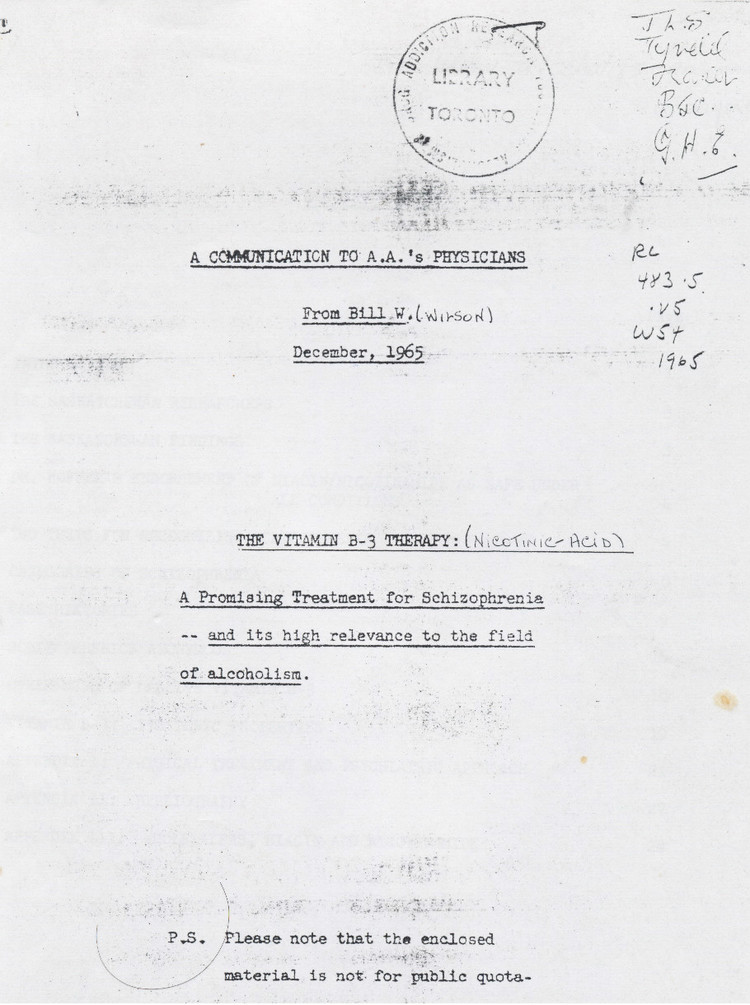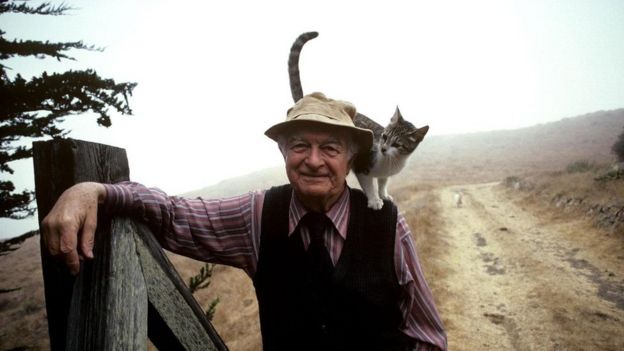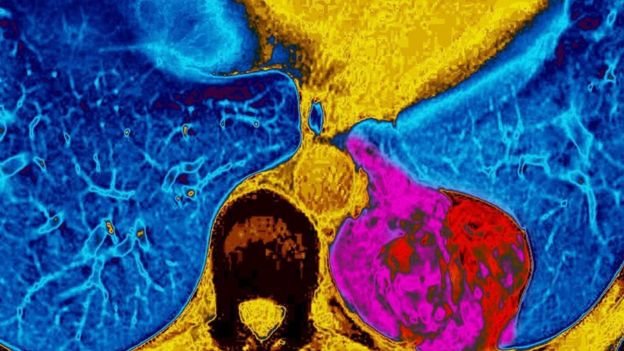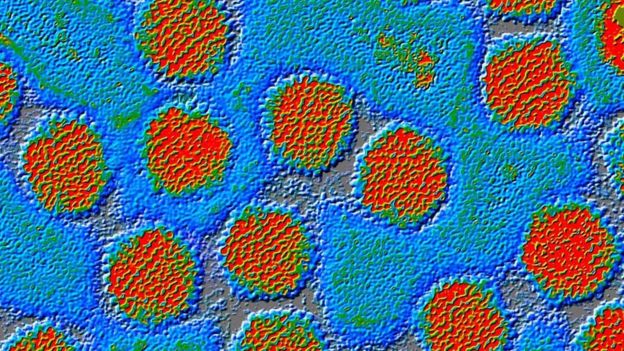The origin and arguments on vitamin supplements of Dr. Linus Pauling
https://frankwaterloo.wordpress.com/2017/01/07/the-origin-and-arguments-on-vitamin-supplements-of-dr-linus-paulin/
Frank Jan. 6, 2016, in Waterloo, Ontario, Canada For a long time, world widely, Dr. Linus Pauling's advocacy of vitamin supplements has been questioned. Today, Jan. 6, 2016, I found Alex Riley Dec. 8, 2016’s Article: Why vitamin pills do not work, and may be bad for you, I was touched and felt that there is need to learn more about vitamin supplements, and search some articles as follow. When referring to the origin of vitamin supplements, I have to mention the most notable man Dr. Abram Hoffer, M.D. Ph.D. – as a psychiatrist of Canada Vancouver based, he personally experienced the process that Canadian doctors were trying to use high-dose vitamins in the treatment of mental illness and achieved a definite therapeutic effect at the time that was no any related medication available. Dr. Abram Hoffer, MD once wrote book Vitamin B-3 and Schizophrenia: Discovery, Recovery, Controversy. I once copied this full book in self-paid. In the book, Dr. Abram Hoffer introduced the reason that he lifelong engaged into the exploration of psychiatric treatment: in early last century, the Canadian mental hospital patients living conditions are extremely tragic in hospital, only when the time of their families’ visiting, hospital gave them a little better clothes. Dec. 21 2011, in article Chinese Medicine – A Promising Therapeutic Approach, I indicate that: “Talking about the restoration of physical balance, we must make clear the physiological effect of nutritional ingredients in Chinese drugs.” “A good example is Orthomolecular medicine (OM). It was coined by Linus Paulin who was enlightened from the successful practice of Canadian doctors who cured mental illness by megadose Vitamin B3 after read the paper of <The Vitamin B-3 Therapy: A Promising Treatment for Schizophrenia – and its high relevance to the field of alcoholism> that wrote by Bill Wilson, a Canadian Physician, in December 1965, that was A communication to A.A.’s Physicians, not for public quotation or use.” In 2003, I specially made a copy of Bill Wilson’s report from: Centre for Addiction and Mental Health, CAMH Library 33 Russell Street, 2nd floor, Toronto,ON,M5S 2S1 Information Desk: 416.535.8501 x6988 The cover is as follow. (A.A. – Alcoholics Anonymous). 
“The OM was originally intended to treat the “mental disease by the provision of the optimal molecular environment of the mind, especially the optimal concentrations of substances normally present in the human body.” OM currently is called as diet supplements that have developed many products, such as, Vitamins, minerals and so on.” “Linus Paulin who published the Nature of the chemical bond in 1939. Later he did many pioneering works in understanding the nature of life from atomic structure, binding mode between atoms, nucleic acids and proteins. Whether from chemical, biological, and medical, he has laid a solid theoretical foundation.” “Vitamin B-3 has wide range of physiological improvement functions. Its therapeutic process for psychotic is to restore damaged brain rather than as that of antipsychotic drugs control the abnormal secretions in the brain. Naturally, OM treats the diseases in a Holistic way.” “Although, for decades, some people have been eagerly trying to deny the curative effect of OM, however, the physiological improvement function is coming clearer in both clinic and academic. Now it gains extensively application world widely. Vitamin C was the one of OM, which was Linus Pauling strongly recommended, also was strongly opposed by others. following are some of new researches on Vitamin C.” “1. Vitamin C Saves Lives! After Linus Pauling wrote his book on vitamin C in 1970, mortality from heart disease decreased 30-40% in the USA. From around 741,000 deaths per year to less than 500,000 deaths by 1986 – U. S. Bureau of National Health Statistics 1986.” “2. Vitamin C may be useful to treat cancer after all.” “3. Study shows vitamin C’s cancer-fighting properties.” “4. Vitamin C beneficial in cancer treatment – study.” “5. How Vitamin C Stops Cancer.” “In TCM, there are variety of nutritional constituents that are far more than that of in OM, which come from more than 10 thousands of plants, minerals and animals, such as, Ginseng, Gypsum and Placenta. They are certainly playing a significant role in the diseases treatment, but their unique contribution seems to have been ignored both clinically and academically.” “The reason may come from the TCM itself because that it never distinguishes the medicinal and nutritional, even without the concepts and terms, they were generally called as medicine. In western medicine, Chinese medicine generally called as alternative or diet supplements. I think that there is necessary to make a definition, such as, those with the effect of killing pathogenic agents should be called as medicinal, and those without the effect of killing pathogenic directly but with the role of physiological improvement should be called as nutritional, include those in Western medicine. A clear concept with a exact term will not only help clear describing, but also conducive to efficient thinking. The determination of a definition is difficult that need to be discussed carefully because of the ingredient of many single herbs is compound that contains both medicinal and nutritional. Even if a single constituent also has a dual role, such as, some peptide is nutritional but also an antibiotic. The nutritionals in Chinese drugs is a promising medical potential to be an attractive research direction.” Follow is links of some article about vitamin supplements and Dr. Linus Paulin Follow is article of Dr. A. Hoffer that introduced about Dr. Linus Paulin Linus Pauling Honours the Canadian Schizophrenia Foundation By A. HofferAbram Hoffer, M.D. Ph.D. http://orthomolecular.org/library/jom/1987/pdf/1987-v02n03-p183.pdf [About A. Hoffer, M.D. Ph.D. – Abram Hoffer (November 11, 1917 – May 27, 2009) was a Canadian biochemist, physician, and psychiatrist known for his “adrenochrome hypothesis” of schizoaffective disorders. According to Hoffer, megavitamin therapy and other nutritional interventions are potentially effective treatments for schizophrenia and other diseases.[citation needed] Hoffer was also involved in studies of LSD as an experimental therapy for alcoholism and the discovery that high-dose niacin can be used to treat high cholesterol and other dyslipidemias. Hoffer’s ideas about megavitamin therapy to treat mental illness are not accepted by the medical community.]
Linus Pauling Honours the Canadian Schizophrenia Foundation at its Sixteenth Annual International Conference and BenGurion Medical School, Department of Psychiatry, May 20th and 21, 1987, at Beer Sheva, Israel. On Friday evening, May 15, 1987, Dr. Linus Pauling presented his views relating the use of optimum doses of vitamins to good health. Vitamin C was given special attention. Dr. Pauling now takes 18 grams per day of Vitamin C, or 300 times the RDA. The lecture is available on audio tape from Kennedy Recordings RR5, Edmonton, Alberta, Canada T5P 4B7. This lecture represented a small portion of the information available from his book, How to Live Longer and Feel Better. Dr. Pauling was introduced by Mr. D.C. (Ben) Webster, Chairman, Helix Investments Ltd. He said: “I would like to offer a very warm welcome to Dr. Linus Pauling and say how happy and privileged we are to have him address us this evening. By the crowd here tonight, I would certainly say that Dr. Pauling’s preeminence precedes him. “Dr. Pauling’s own accomplishments have led to: Two Nobel Prizes, one in chemistry in 1954, and one for peace in 1962, and 40 honorary degrees from colleges and universities in the USA and abroad. Furthermore, when the structure of DNA was discovered, Dr. Pauling was actively engaged in his own investigations and, according to his peers, could have received a third Nobel Prize! He missed a crucial meeting in the U.K. because the U.S. government would not release his passport. “Linus Pauling has been ever-willing to take on new challenges for the benefit of humanity as a whole, and has not been afraid to support unpopular causes. Such was the case with his early identification of the danger in the spread of nuclear testing and contamination, and is the case with his active work over the last two decades in support of the nutritional approach towards alleviation of disease, particularly Vitamin C. “There is today enormous medical opposition to the idea that disease has an important nutritional component, a resistance which, as a layman is most difficult to understand. Medical and health care groups, including their journals and organized associations, not only do not support high nutrition as a serious means toward better health, but are often antagonistic toward those who make forays into the area, generally dismissing them with the label “unscientific,” when they wish to be kind. This antagonism is given tacit support by the drug companies as they have very little to gain from the understanding and treatment of disease through such low-cost and unpatentable remedies as do-it-yourself mega nutrition. “But such opposition does not disturb Dr. Pauling. He has spent the last 20 years of his enormously productive life developing and publicizing his ideas in the field, and I would predict he has another 20 years to go! As long as he stays on his Vitamin C. “His recent book, How to Live Longer and Feel Better, is quite possibly the most important publication to date in the field of nutrition and disease. It is well footnoted and indexed and contains an enormous amount of relevant information. “Of interest to Canadians is that 23 years ago, Dr. Pauling was catalyzed towards his interest in nutrition and disease by two pioneering Canadian medical men: Dr. Abram Hoffer and Dr. Humphry Osmond. They were pioneering not only because Abe Hoffer came from a very small town in Saskatchewan (named after his forebears), what else but Hoffer, Saskatchewan. Also Dr. Osmond was a pioneer as well as he practised in Weyburn, Saskatchewan. They were pioneering, he and Dr. Osmond together, from their clinical experience with their patients, and their subsequent research and double-blind studies, realized that nutrition had a pivotal effect on mental illness. On the basis of their early work, and his own investigation, Dr. Pauling coined the term “Orthomolecular psychiatry” to isolate and designate this field of endeavour. “It is very exciting to have Dr. Pauling here today who is, in fact, on his way to Israel for the commemoration of the chair in Orthomolecular psychiatry at Ben-Gurion Medical School in Beer Sheva. “As a footnote, Dr. Pauling will be speaking tomorrow on the subject of Vitamin C and cancer at the conference of the CSF here at the Park Plaza. You are welcome to join us for the conference, hear Dr. Pauling, and to listen to the other scientists and doctors who will be conducting seminars and giving speeches. “It gives me great pleasure to introduce Dr. Pauling.” After the lecture I concluded this session by thanking Dr. Pauling on behalf of the CSF. Then I quoted from a presentation he had made in the fall of 1962 at a Manfred Sakel meeting (L.C. Page and Co., Farrar Strauss and Geroux, New York, 1966. Ed Max Rinkel). He said, “The ethical principle of minimizing human suffering requires we all work together in overcoming the causes of suffering…I believe that the time will come, perhaps in 10 or 20 years when, if enough effort is made, there will be obtained some significant understanding of the nature of the groups of diseases we classify as schizophrenia and of other mental diseases comparable to that which now exists for a few diseases that are called molecular diseases.” Then I concluded, “…your work, your willingness to become involved is of inestimable value in changing medicine so that, to use your words, we can all conform to your ethical principle of minimizing human suffering.” At Ben-Gurion Medical school Dr. Linus Pauling was present at the dedication of the Hoffer-Vickar Chair of Psychiatry — A Unit of Orthomolecular Research. This chair was given by Edward and Marion Vickar of Winnipeg, Manitoba. anitoba. The following morning Dr. Pauling participated in the seminar on Orthomolecular psychiatry chaired by Prof. R.H. Belmaker; again there was an overflow crowd who came to the desert city to hear Dr. Pauling. We dose up on antioxidants as if they are the elixir of life. At best, they are probably ineffective. At worse, they may just send you to an early grave. 8 December 2016 For Linus Pauling, it all started to go wrong when he changed his breakfast routine. In 1964, at the age of 65, he started adding vitamin C to his orange juice in the morning. It was like adding sugar to Coca Cola, and he believed – wholeheartedly, sometimes vehemently – that it was a good thing. Before this, his breakfasts were nothing to write about. Just that they happened early every morning before going to work at California Institute of Technology, even on weekends. He was indefatigable, and his work was fruitful. At the age of 30, for instance, he proposed a third fundamental way that atoms are held together in molecules, melding ideas from both chemistry and quantum mechanics. Twenty years later, his work into how proteins (the building blocks of all life) are structured helped Francis Crick and James Watson decode the structure of DNA (the code of said building blocks) in 1953. The next year, Pauling was awarded a Nobel Prize in Chemistry for his insights into how molecules are held together. As Nick Lane, a biochemist from University College London, writes in his 2001 book Oxygen, “Pauling… was a colossus of 20th Century science, whose work laid the foundations of modern chemistry.”
Linus Pauling was one of our most influential scientists, yet his belief in the power of antioxidants may have set us down a dangerous path (Credit: Getty Images) But then came the vitamin C days. In his 1970 bestselling book, How To Live Longer and Feel Better, Pauling argued that such supplementation could cure the common cold. He consumed 18,000 milligrams (18 grams) of the stuff per day, 50 times the recommended daily allowance. In the book’s second edition, he added flu to the list of easy fixes. When HIV spread in the US during the 1980s, he claimed that vitamin C could cure that, too. In 1992, his ideas were featured on the cover of Time Magazine under the headline: “The Real Power of Vitamins”. They were touted as treatments for cardiovascular diseases, cataracts, and even cancer. “Even more provocative are glimmerings that vitamins can stave off the normal ravages of ageing,” the article claimed. Sales in multivitamins and other dietary supplements boomed, as did Pauling’s fame. But his academic reputation went the other way. Over the years, vitamin C, and many other dietary supplements, have found little backing from scientific study. In fact, with every spoonful of supplement he added to his orange juice, Pauling was more likely harming rather than helping his body. His ideas have not just proven to be wrong, but ultimately dangerous.
Antioxidants were meant to delay the ravages of ageing, but there’s little evidence that supplements bring any noticeable benefits (Credit: Getty Images) Pauling was basing his theories on the fact that vitamin C is an antioxidant, a breed of molecules that includes vitamin E, beta-carotene, and folic acid. Their benefits are thought to arise from the fact that they neutralise highly reactive molecules called free-radicals. In 1954, Rebeca Gerschman then at the University of Rochester, New York, first identified these molecules as a possible danger – ideas expanded upon by Denham Harman, from the Donner Laboratory of Medical Physics at UC Berkeley in 1956, who argued that free radicals can lead to cellular deterioration, disease and, ultimately, ageing. Throughout the 20th Century, scientists steadily built on his ideas and they soon became widely accepted. Here’s how it works. The process starts with mitochondria, those tiny combustion engines that sit within our cells. Inside their internal membranes food and oxygen are converted into water, carbon dioxide, and energy. This is respiration, a mechanism that fuels all complex life. ‘Leaky watermills’ But it isn’t so simple. In addition to food and oxygen, a continuous flow of negatively charged particles called electrons is also required. Like a subcellular stream downhill powering a series of watermills, this flow is maintained across four proteins, each embedded in the internal membrane of the mitochondria, powering the production of the end product: energy. This reaction fuels everything we do, but it is an imperfect process. There is some leakage of electrons from three of the cellular watermills, each able to react with oxygen molecules nearby. The result is a free radical, a radically reactive molecule with a free electron. Oxygen is the breath of life, but it also holds the potential to make us old, decrepit, and then dead
In order to regain stability, free radicals wreak havoc on the structures around them, ripping electrons from vital molecules such as DNA and proteins in order to balance its own charge. Although inconceivably small in scale, the production of free radicals, Harman and many others posited, would gradually take its toll on our entire bodies, causing mutations that can lead to ageing and age-related diseases such as cancer. In short, oxygen is the breath of life, but it also holds the potential to make us old, decrepit, and then dead.
Clinical trials are the only ways to reveal the effects of a drug – and investigations into antioxidants have produced some shocking results (Credit: Alamy) Shortly after free radicals were linked to ageing and disease, they were seen as enemies that should be purged from our bodies. In 1972, for example, Harman wrote, “Decreasing [free radicals] in an organism might be expected to result in a decreased rate of biological degradation with an accompanying increase in the years of useful, healthy life. It is hoped that [this theory] will lead to fruitful experiments directed toward increasing the healthy human lifespan.” He was talking about antioxidants, molecules that accept electrons from free radicals thereby diffusing the threat. And the experiments he hoped for were sown, nurtured, and replicated over the next few decades. But they bore little fruit. The results were the largely the same: an excess of antioxidants didn’t quell the ravages of ageing, nor stop the onset of disease
In the 1970s and into the 80s, for example, many mice – our go-to laboratory animal – were prescribed a variety of supplementary antioxidants in their diet or via an injection straight into the bloodstream. Some were even genetically modified so that the genes coding for certain antioxidants were more active than non-modified lab mice. Although different in method, the results were the largely the same: an excess of antioxidants didn’t quell the ravages of ageing, nor stop the onset of disease. “They never really proved that they were extending lifespan, or improving it,” says Antonio Enriquez from the Spanish National Centre for Cardiovascular Research in Madrid. “Mice don’t care for [supplements] very much.”
Far from protecting us from disease, one study found that vitamin supplements increased the incidence of lung cancer among smokers (Credit: Alamy) What about humans? Unlike our smaller mammalian kin, scientists can’t take members of society into labs and monitor their health over their lifetime, while controlling for any extraneous factors that could bias the results at the end. But what they can do is set up long-term clinical trials. The premise is pretty simple. First, find a group of people similar in age, location, and lifestyle. Second, split them into two subgroups. One half receives the supplement you’re interested in testing, while the other receives a blank – a sugar pill, a placebo. Third, and crucially to avoid unintentional bias, no one knows who was given which until after the trial; not even those administering the treatment. The incidence of lung cancer increased by 16% in the group given vitamin supplements
Known as a double-blind control trial, this is the gold standard of pharmaceutical research. Since the 1970s, there have been many trials like this trying to figure out what antioxidant supplementation does for our health and survival. The results are far from heartening. In 1994, for example, one trial followed the lives of 29,133 Finish people in their 50s. All smoked, but only some were given beta-carotene supplements. Within this group, the incidence of lung cancer increased by 16%. A similar result was found in postmenopausal women in the U.S. After 10 years of taking folic acid (a variety of B vitamin) every day their risk of breast cancer increased by 20% relative to those women who didn’t take the supplement. It gets worse. One study of more than 1,000 heavy smokers published in 1996 had to be terminated nearly two years early. After just four years of beta-carotene and vitamin A supplementation, there was a 28% increase in lung cancer rates and a 17% increase in those who died. These aren’t trivial numbers. Compared to placebo, 20 more people were dying every year when taking these two supplements. Over the four years of the trial, that equates to 80 more deaths. As the authors wrote at the time, “The present findings provide ample grounds to discourage use of supplemental beta-carotene and the combination of beta-carotene and vitamin A.” Fatal ideas Of course, these notable studies don’t tell the full story. There are some studies that do show benefits of taking antioxidants, especially when the population sampled doesn’t have access to a healthy diet. But, according a review from 2012 that noted the conclusions of 27 clinical trials assessing the efficacy of a variety of antioxidants, the weight of evidence does not fall in its favour. Just seven studies reported that supplementation led to some sort of health benefit from antioxidant supplements, including reduced risk of coronary heart disease and pancreatic cancer. Ten studies didn’t see any benefit at all – it was as if all patients were given the sugar pill also (but, of course, they weren’t). That left another 10 studies that found many patients to be in a measurably worse state after being administered antioxidants than before, including an increased incidence of diseases such as lung and breast cancer. The idea that antioxidant supplements are a miracle cure is completely redundant – Antonio Enriquez
“The idea that antioxidant [supplementation] is a miracle cure is completely redundant,” says Enriquez. Linus Pauling was largely unaware of the fact that his own ideas could be fatal. In 1994, before the publication of many of the large-scale clinical trials, he died of prostate cancer. Vitamin C certainly wasn’t the cure-all that he cantankerously claimed it was up until his last breath. But did it contribute to a heightened risk?
Dosing up on vitamin C does not even help us fight the common cold (Credit: Alamy) We’ll never know for sure. But given that multiple studies have linked excess antioxidants to cancer, it certainly isn’t out of the question. A study published in 2007 from the US National Cancer Institute, for instance, found that men that took multivitamins were twice as likely to die from prostate cancer compared to those who didn’t. And in 2011, a similar study on 35,533 healthy men found that vitamin E and selenium supplementation increased prostate cancer by 17%. Ever since Harman proposed his great theory of free radicals and ageing, the neat separation of antioxidants and free radicals (oxidants) has been deteriorating. It has aged. Antioxidant is only a name, not a fixed definition of nature. Take vitamin C, Pauling’s preferred supplement. At the correct dose, vitamin C neutralises highly charged free radicals by accepting their free electron. It’s a molecular martyr, taking the hit upon itself to protect the cellular neighbourhood. But by accepting an electron, the vitamin C becomes a free radical itself, able to damage cell membranes, proteins and DNA. As the food chemist William Porter wrote in 1993, “[vitamin C] is truly a two-headed Janus, a Dr Jekyll-Mr Hyde, an oxymoron of antioxidants.” Thankfully, in normal circumstances, the enzyme vitamin C reductase can return vitamin C’s antioxidant persona. But what if there’s so much vitamin C that it simply can’t keep up with supply? Although such simplifying of complex biochemistry is in itself problematic, the clinical trials above provide some possible outcomes. Divide and conquer Antioxidants have a dark side. And, with increasing evidence that free radicals themselves are essential for our health, even their good side isn’t always helpful. Without free radicals, cells would continue to grow and divide uncontrollably
We now know that free radicals are often used as molecular messengers that send signals from one region of the cell to another. In this role, they have been shown to modulate when a cell grows, when it divides in two, and when it dies. At every stage of a cell’s life, free radicals are vital. Without them, cells would continue to grow and divide uncontrollably. There’s a word for this: cancer. We would also be more prone to infections from outside. When under stress from an unwanted bacterium or virus, free radicals are naturally produced in higher numbers, acting as silent klaxons to our immune system. In response, those cells at the vanguard of our immune defense – macrophages and lymphocytes – start to divide and scout out the problem. If it is a bacterium, they will engulf it like Pac-Man eating a blue ghost. It is trapped, but it is not yet dead. To change that, free radicals are once again called into action. Inside the immune cell, they are used for what they are infamous for: to damage and to kill. The intruder is torn apart. From start to finish, a healthy immune response depends on free radicals being there for us, within us. As geneticists Joao Pedro Magalhaes and George Church wrote in 2006: “In the same way that fire is dangerous and nonetheless humans learned how to use it, it now appears that cells evolved mechanisms to control and use [free radicals].” Put another way, freeing ourselves of free radicals with antioxidants is not a good idea. “You would leave the body helpless against some infections,” says Enriquez.
Few would dispute that a balanced diet is essential for good health, but most of us don’t need supplements to meet our nutritional needs (Credit: Getty Images) Thankfully, your body has systems in place to keep a your inner biochemistry as stable as possible. For antioxidants, this generally involves filtering any excess out of the bloodstream into urine for disposal. “They go in the toilet,” says Cleva Villanueva from Instituto Politécnico Nacional, Mexico City, in an email. “We’re very good at balancing things out so that the affect [of supplementation] is moderate whatever you do, which we should be grateful for,” says Lane. Our bodies have been selected to balance the risk of oxygen ever since the first microbes started to breathe this toxic gas. We can’t change billions of years of evolution with a simple pill. No one would deny that vitamin C is vital to a healthy lifestyle, as are all antioxidants, but unless you are following doctor’s orders, these supplements are rarely going to be the answer for a longer life when a healthy diet is also an option. “Administration of antioxidants is justified only when it is evident that there is a real deficiency of a specific antioxidant,” says Villanueva. “The best option is to get antioxidants from food because it contains a mixture of antioxidants that work together.” “Diets rich in fruits and vegetables have been shown generally to be good for you,” says Lane. “Not invariably, but generally that’s agreed to be the case.” Although often attributed to antioxidants, the benefits of such a diet, he says, might also hail from a healthy balance of pro-oxidants and other compounds whose roles aren’t yet fully understood. After decades of unlocking the baroque biochemistry of free radicals and antioxidants, hundreds of thousands of volunteers, and millions of pounds spent on clinical trials, the best conclusion that 21st Century science has to offer is also found within a child’s classroom – eat your five-a-day. Alex Riley 亚历克斯·莱利 http://www.bbc.com/ukchina/simp/vert-fut-38529250 自从莱纳斯·鲍林(Linus Pauling)改变早餐习惯以来,方向就跑偏了。1964年,65岁的鲍林开始在早餐的橙汁中加入维生素C。这就像在可口可乐里面加糖一样,但他却对这么做的好处深信不疑。 在此之前,他的早餐平淡无奇,吃完之后就会赶往加州理工学院上班,就连周末也不例外。他工作勤奋,硕果累累。 例如,他30岁就融合化学与量子力学两门学科的知识,提出了原子结合成分子的第三种基本方式。20年后,他对蛋白质(所有生命的组成模块)结构的研究帮助弗朗西斯·克里克(Francis Crick)和詹姆斯·沃森(James Watson)在1953年解开了DNA的结构密码(上述生命组成模块的密码)。 第二年,鲍林因为在分子结合方式领域的研究而获得诺贝尔化学奖。伦敦大学学院生物科学家尼克·莱恩(Nick Lane)在他2001年出版的《氧》(Oxygen)一书中写道:”鲍林是20世纪的科学巨人,他的成果为现代化学奠定了基础。”
 莱纳斯·鲍林是最具影响力的科学家之一,但他对抗氧化剂的深信不疑却把我们引上了一条危险的道路 莱纳斯·鲍林是最具影响力的科学家之一,但他对抗氧化剂的深信不疑却把我们引上了一条危险的道路
回过头来接着说他服用维生素C的那段日子。在他1970年的畅销书《怎么才能活得更长,感觉更好》(How To Live Longer and Feel Better)中,鲍林认为这种补剂可以治愈普通感冒。他每天摄入1.8万毫克(18克)维生素C,达到普通人每日推荐摄入量的50倍。 在那本书的第二版中,他还将流感加入了维生素可以轻易治愈的疾病名单。当艾滋病上世纪80年代在美国传播时,他甚至声称维生素C也能治愈艾滋病。 1992年,他的观点登上了《时代》周刊的封面,标题是:《维生素的真正力量》(The Real Power of Vitamins)。他认为这种物质可以治疗心血管病、白内障甚至癌症。”更令人振奋的是,有迹象显示维生素还能延缓正常的衰老。”那篇文章写道。 得益于鲍林的卓越声誉,多维元素片和其他膳食补充剂的销量激增。 但他的学术声誉却受到了损害。多年以来,维生素C和其他膳食补充剂的作用几乎没有得到科学研究的支撑。事实上,鲍林向橙汁中加入膳食补充剂的做法可谓弊大于利。他的想法不仅已经被证伪,甚至会最终危害人体健康。
 有人认为抗氧化剂可以延缓衰老,但没有太多证据显示这些补充剂能够带来任何显著益处 有人认为抗氧化剂可以延缓衰老,但没有太多证据显示这些补充剂能够带来任何显著益处
鲍林的理论基础在于:维生素C是一种抗氧化剂,这个家族的成员还包括维生素E、β-胡萝卜素和叶酸。他之所以认为这些物质有好处,是因为它们能中和高度活跃的自由基分子。 1954年,当时还任职于纽约罗彻斯特大学的丽贝卡·歌诗曼(Rebeca Gerschman)首次发现这些分子可能危害人体健康——美国加州大学伯克利分校唐纳医学物理实验室的德纳姆·哈曼(Denham Harman)在1956年进一步阐述了这种理论,他认为自由基可以导致细胞退化和疾病,最终引发衰老。 整个20世纪,科学家逐步完善了他的理论,使之成为一种普遍接受的学说。 这种理论的大致内容如下:整个过程始于线粒体,也就是那些存在于我们细胞中的微型内燃机。在它们的内膜内部,食物和氧被转化成水、二氧化碳和能量。这就是呼吸作用,正是这种机制为所有复杂生命体供给了能量。 泄露的水车 但实际情况远不止这么简单。除了食物和氧之外,还需要源源不断地流入负荷粒子,也就是电子。就像一段自上而下推动一系列水车转动的亚细胞流一样,这种流体需要在4种蛋白质中不断维持,每一种蛋白质都嵌入在线粒体的内膜中,促进最终产品的生产:能量。 这种反应正是我们做一切事情的能量基础,但这个过程却并不完美。有3个细胞水车会发生一定程度的电子泄露,每一个电子都会与附近的氧分子发生反应。反应的结果便是自由基,这是一种带有自由电子且极易发生反应的分子。 为了重新获得稳定,自由基会在周围的结构中肆虐,从DNA和蛋白质等至关重要的分子上夺取电子,从而平衡自己的电荷。虽然规模很小,但哈曼等人认为,由此产生的自由基会逐步损害我们的整个身体,引发突变,从而导致衰老以及癌症等与衰老有关的疾病。 简而言之,氧是维持生命不可或缺的物质,但它也有可能导致我们衰老和死亡。
 临床试验是揭示药物效果的唯一方式——而对抗氧化剂的调查则让我们看到了一些令人震惊的结果 临床试验是揭示药物效果的唯一方式——而对抗氧化剂的调查则让我们看到了一些令人震惊的结果
当科学研究在自由基与衰老和疾病之间建立联系后不久,它们便被视作健康的敌人,应该从身体中彻底清除。例如,哈曼1972年写道:”生物体内自由基的减少或许有望减慢生化降解速度,同时延长我们的健康寿命。(这项理论)还有望催生各种富有成效的实验,从而延长人类的健康寿命。” 他谈论的正是抗氧化剂,这种分子可以接受来自自由基的电子,从而减轻自由基产生的威胁。随后几十年,科学家按照他的理论进行了许多实验,但却几乎没有看到任何效果。 例如,在上世纪70年代和80年代初,很多科学家在老鼠的食物中加入了各种抗氧化剂,或者直接向其血液中注射这种物质。有科学家甚至对老鼠进行了转基因培育,使之能够对某些抗氧化剂表现得更加活跃。 尽管采用了不同方式,但结果却基本相同:增加抗氧化剂并没有延缓衰老,也没有阻止疾病发生。 “他们从未真正证明抗氧化剂能延长寿命或改善生活质量。”西班牙国家心血管研究中心的安东尼奥·恩里克斯(Antonio Enriquez)说,”老鼠对这种补充剂反应不大。”
 一项研究发现,维生素补充剂不仅无法预防疾病,甚至还会增加烟民患肺癌的几率 一项研究发现,维生素补充剂不仅无法预防疾病,甚至还会增加烟民患肺癌的几率
人类又是什么情况呢?与老鼠不同,科学家无法把真人放进实验室,监测他们一生的健康状况,同样也无法控制可能导致最终结果产生偏差的外界因素。但仍然可以展开长期的临床试验。 前提很简单。首先找到一群年龄、地点、生活状态相似的人。然后将其分成两组,一组服用研究人员选定的补充剂,另外一组则服用纯糖丸制作的安慰剂。第三点尤为重要,那就是避免出现无意识的偏见,所以在实验结束之前,没有人知道每个人服用的具体是补充剂还是安慰剂——甚至连试验负责人也不例外。 这种所谓的双盲实验是药学研究中的黄金标准。自从20世纪70年代以来,已经进行了很多类似的实验,试图搞清楚抗氧化剂究竟会对我们的健康和生存产生何种影响。结果并不乐观。 例如,1994年的一项试验对29,133名50多岁的芬兰人进行了追踪。他们都是烟民,但摄入β-胡萝卜素的一组志愿者患肺癌的概率却增加了16%。 美国科研人员对绝经后的妇女进行的临床试验也得出了类似的结论。在连续10年每天服用叶酸(一种B族维生素)后,她们的乳腺癌发病率较没有服用这种补充剂的人增加了20%。 更糟糕的是,一项1996年发表的针对1,000多名重度吸烟者进行的研究不得不提前2年结束。在受试者服用短短4年的β-胡萝卜素和维生素A补充剂后,肺癌患病率就增加了28%,死亡率增加了17%。 这些数据的差异非常惊人。与服用安慰剂的人群相比,摄入这两种补充剂的一组受测者每年死亡的人数多出20人。经过4年临床试验后,死亡的总人数多出80人。该研究的作者当时写道:”试验结果提供了充分的理由阻止人们摄入β-胡萝卜素以及β-胡萝卜素和维生素A的组合。” 致命理念 当然,这些著名的研究并不能反映事情的全貌。还有一些研究表明,服用抗氧化剂的确有一定的好处,尤其是对那些饮食不健康的人群。 但2012年的一份评估报告显示,综合27项临床试验结果来看,抗氧化剂的效果并不理想。 只有7项实验显示抗氧化剂有益健康,包括降低冠心病和胰腺癌的患病风险。还有10项研究没有发现任何益处。另有10项实验发现很多病人在服用抗氧化剂之后的情况明显恶化,包括肺癌和乳腺癌等疾病的患病风险增加。 “抗氧化剂是灵丹妙药的想法纯属多余。”恩里克斯说。莱纳斯·鲍林几乎没有意识到,他的这种想法本身就有可能致命。1994年,在很多大规模临床试验发布之前,他本人已经死于前列腺癌。维生素C显然不是他所说的灵丹妙药,但他一直到临死前都不肯承认。不过,真的是因为这些抗氧化剂才增加了患病风险吗?
 服用维生素C甚至不能帮助我们对抗普通感冒 服用维生素C甚至不能帮助我们对抗普通感冒
我们永远无法知道确切答案。但由于众多研究都在过量服用抗氧化剂与癌症之间建立了相关性,所以这显然并不是不可能做到的事情。例如,美国国家癌症研究所2007年的一项研究发现,服用多种维生素的男性因前列腺癌死亡的风险达到其他男性的两倍。2011年对35,533名健康男性进行的一项类似研究也发现,维生素E和硒补充剂会将前列腺癌的患病风险提升17%。 自从哈曼提出了关于自由基和衰老的伟大理论后,抗氧化剂和自由基(氧化剂)之间的差异已经非常明确。整套理论都已成熟。 抗氧化剂只是一个名称,并非确切的性质界定。以鲍林喜欢的维生素C为例,按照正确计量,维生素C可以通过接收自由电子来中和活跃度极高的自由基。它是一种分子殉道者,通过牺牲自己来保护附近的细胞。 但接受了电子之后,维生素C自己就变成了自由基,可以破坏细胞膜、蛋白质和DNA。食品化学家威廉·波特(William Porter)1993年写道:”(维生素C)其实是个两面派。” 幸好在正常环境中,维生素C还原酶可以恢复它的抗氧化性。但如果维生素C过量,又会发生什么情况?尽管简化这一复杂的生物化学过程本身就有问题,但上述临床实验的确提供了一些可能的结果。 各个击破 抗氧化剂也有阴暗面,而且越来越多的证据显示,自由基本身也对人体健康至关重要,就连抗氧化剂的益处也未必总能给我们带来帮助。 我们现在知道,自由基经常充当分子信使的角色,负责将信号从细胞的一个区域传送到另一个区域。正是因为具备这种职责,所以它们需要在细胞增长、分裂和死亡时进行调节。在细胞生命的每个阶段,自由基都扮演了至关重要的角色。 没有自由基,细胞就会不受控制地生长和分裂,医学上有一个专用名词来描述这种状况:癌症。 我们也更容易受到外部感染的影响。当面临有害的细菌或病毒施加的压力时,自由基的数量会自然增加,充当我们免疫系统的静音警报。为了应对这种情况,免疫系统中的先锋细胞——巨噬细胞和淋巴细胞——就会开始分裂,侦查身体出现的问题。如果是细菌,它们就会像《吃豆人》游戏一样吞噬这些不速之客。 此时,细菌已经被困,但尚未死亡。为了改变这一状况,自由基就会再次行动。在免疫细胞内部,自由基便会发挥它臭名昭著的破坏和杀戮功能。这时,入侵者就会被彻底清除。 从开始到最后,健康的免疫系统都是依靠体内的自由基作出反应的。遗传学家若昂·佩德罗·马加良斯(Joao Pedro Magalhaes)和乔治·丘奇(Goerge Church)在2006年写道:”火也很危险,但人类还是学会了如何用火。与之相同,细胞已经进化出各种机制来控制和利用自由基。” 换句话说,使用抗氧化剂消灭体内的自由基不是个好主意。”这会导致身体在面对某些感染时陷入无助。”恩里克斯说。
 很少有人否认均衡饮食对健康的重要性,但多数人都不需要通过补充剂来满足身体的营养需求 很少有人否认均衡饮食对健康的重要性,但多数人都不需要通过补充剂来满足身体的营养需求
人体拥有各种各样的系统,能够尽可能保持内部生物化学环境的稳定。具体到抗氧化剂,人体通常会将血液中过量的抗氧化剂通过尿液排出体外。”它们都跑到马桶里去了。”墨西哥国立理工学院的克莱瓦·维拉努埃瓦(Cleva Villanueva)说。 “人体很擅长保持平衡,所以(补充剂的)作用是调节你的行为,你应该对此心怀感激。”莱恩说。自从第一批微生物开始吸收氧气以来,便开始了漫长的进化之旅,而如今的人类已经可以平衡氧气带来的风险。我们不可能仅凭一粒药丸就改变数十亿年来的进化成果。 没有人否认维生素C对健康的重要作用,所有抗氧化剂均是如此。但除非得到医生的建议,否则在可以获得健康饮食的情况下,这些补充剂几乎不会延长你的生命。”只有当真的缺乏某种抗氧化剂时,才应该主动摄入。”维拉努埃瓦说,”最好的选择是通过食物获取抗氧化剂,因为其中包含了可以相互配合的多种抗氧化剂。” “总的来说,多吃水果和蔬菜都有益于健康。”莱恩说,”虽然这并不是绝对的,但通常如此。”尽管其中的好处往往会归功于抗氧化剂,但他表示,这种饮食方式带来的好处或许也源自促氧化剂和其他化合物的均衡摄入,而这些物质的作用尚未完全被人类所了解。 人类对自由基和抗氧化剂的复杂生物化学作用展开了几十年的研究,期间有数十万志愿者参与,相关临床研究投入的资金也高达数百万英镑,但21世纪的最新科研成果给出的结论却与你小时候在课堂上学到的知识并无二致—— 每天吃5份水果或蔬菜。 请访问 BBC Future 阅读 英文原文。
|
